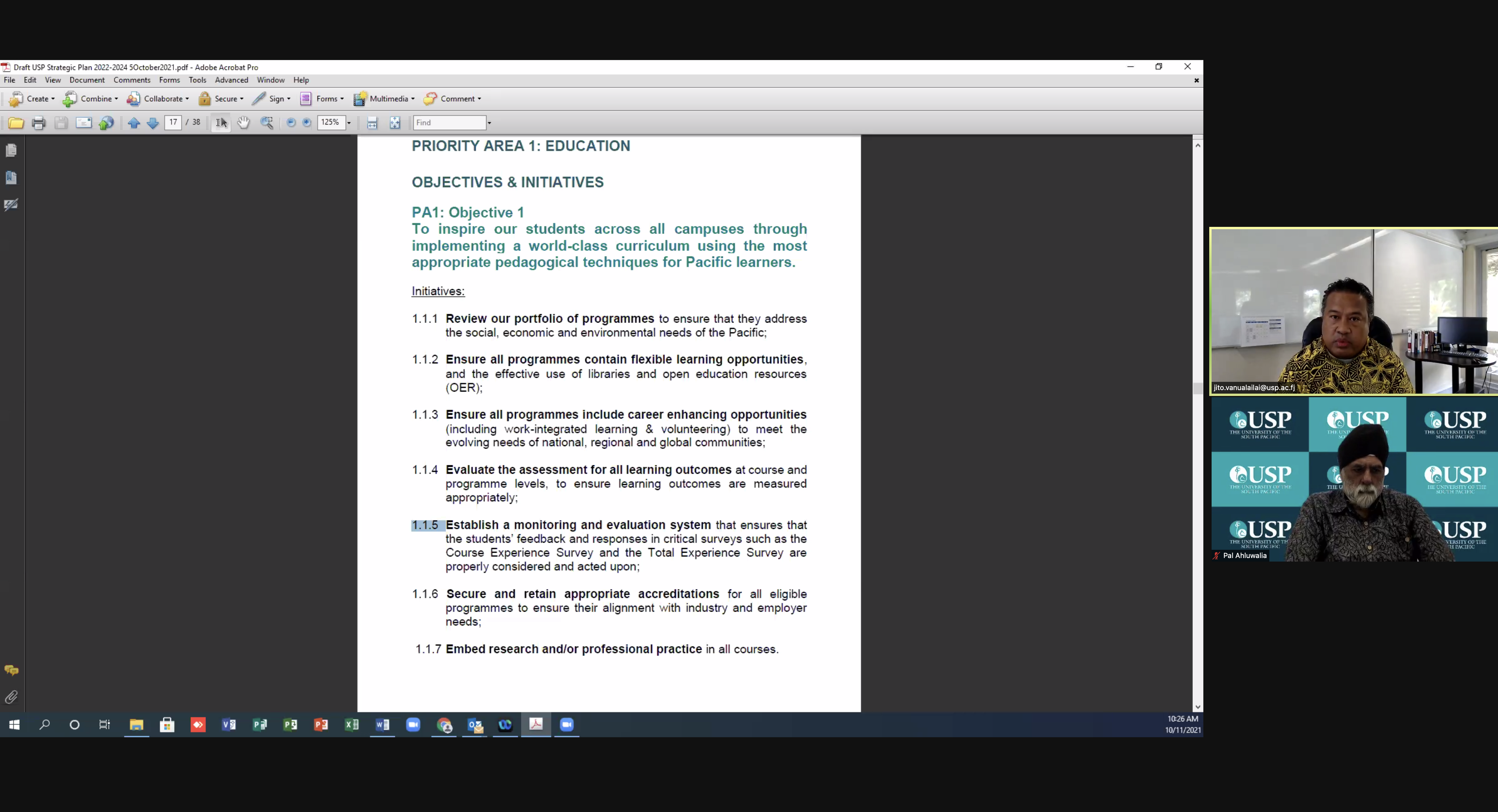Related News

The University of the South Pacific (USP) kick-started virtual interactive discussions on USP’s draft Strategic Plan (SP) 2022-2024 this week.
The Vice-Chancellor & President, Professor Pal Ahluwalia welcomed staff and students during the opening webinar, which also included members of the Senior Management Team followed by a Q&A with participants towards the end.
This SP 2022-2024 will build on previous plans and refresh certain aspects that USP now recognises as requiring adaptation.
Professor Ahluwalia said the opinions of the staff and students mattered the most.
“We are paying particular attention to the student experience at a time when we have had to rethink our teaching and learning strategy in line with remote teaching. More importantly, this refresh has emboldened our commitment to being a student and staff focused University,” he said.
He said the draft SP included critical additions which the University did not have in the last SP.
“The Priority Areas (PA) from the last Plan have been strengthened, and Key Performance Indicators have also been reviewed to reflect the actual deliverables under each area,” Professor Ahluwalia said.
He was pleased to have a one to one discussion with the staff and students on the five strategic PAs.
Acting Deputy Vice-Chancellor Education, Professor Jito Vanualailai said the Priority Area 1: Education, is USP’s core business in providing the best possible support for each student to succeed.
“The suggested changes to this PA is based on our focus for the next biennium 2022-2024 to creating a student-centred and quality-focused high education by improving the student experience. It deals with the quality of our education, learning environment and resources that the students get,” he said.
Looking at the COVID-19 climate, he noted, “it can flare up at any time,” and “we need to work accordingly”.
Director Research, Professor Sushil Kumar, said that Priority Area 2: Research, Innovation and Partnerships, addresses member countries’ needs and contributes internationally to knowledge production and transfer.
“This area aims to build a dynamic research culture that empowers our students and creates a new knowledge, the positive change, and a sustainable society,” he said.
“We have identified a team to address the importance of the Pacific region, as well as to meet the UN’s Sustainable Development Goals, and each team targets in particular goals.”
Deputy Vice-Chancellor (Regional Campuses, Estates & Infrastructure), Dr Giulio Masasso Tu’ikolongahau Paunga said that Priority Area 3: Regional Campuses & Global Engagement, reflects the importance of our Regional Campuses and Centres to the overall success of USP’s vision and mission recognising the education and research needs of our member countries.
“USP Regional Campuses and Centres are diverse in size and scope; they build strong connections to participating governments and communities while providing equal learning opportunities for students across the Pacific. We need to make sure that our delivery of our services, especially for learning and teaching, and also research is excellent, and always on top of everything,” he said.
The University’s goal for the regional campuses, he explained, is to ensure equity.
“We want the same kind of education delivered in all regional campuses as delivered in Laucala Campus,” said Dr Paunga.
“We are unable to deliver certain courses at the regional campus, especially with the science courses. But this SP enables us to work together with the government and development partners to be able to do to help us establish some of these facilities at the regional campuses to increase our equity of having students access physically to this.”
Regional Programme Coordinator, Dr Avinash Kumar emphasised the importance of Priority Area 4: Regional Cooperation and Engagement, which intends to enhance USP’s engagement and cooperation with the key international and regional stakeholders, including the international development partners and regional agencies, including the CROP – Council of Regional Originations in the Pacific.
“The importance of USP in the CROP mechanism and in particular the key role USP plays and will continue to play as the Chair of the ICT Working Group, and the Human Resources & Development Working Group,” he said.
He also noted the crucial role that PAcREF Unit will play for human resource development in the region.
“Through PA 4, USP will be able to make a valuable contribution towards the development of the Pacific region as it was a means by which USP will continue to support regionalism.”
Lastly, Executive Director of Finance, Mr Kolinio Boila said that Priority Area 5: Governance and Intelligent Use of Resources, is essential to enhance the student experience and staff experience.
“The first area of priority is around governance, and the University is committed to ensuring that all Council members and senior management have a shared understanding of risk, and the changing operational and regulatory landscape of the University,” he said.
“We will ensure that we deploy ICT resources intelligently for the benefit of students and staff. The financial resources, including critical investments in facilities and ICT infrastructure, will be used in a highly sustainable manner.”
The week-long SP consultations will end on 15 October 2021. The Link to Moodle is: https://elearn.usp.ac.fj/course/view.php?id=2086